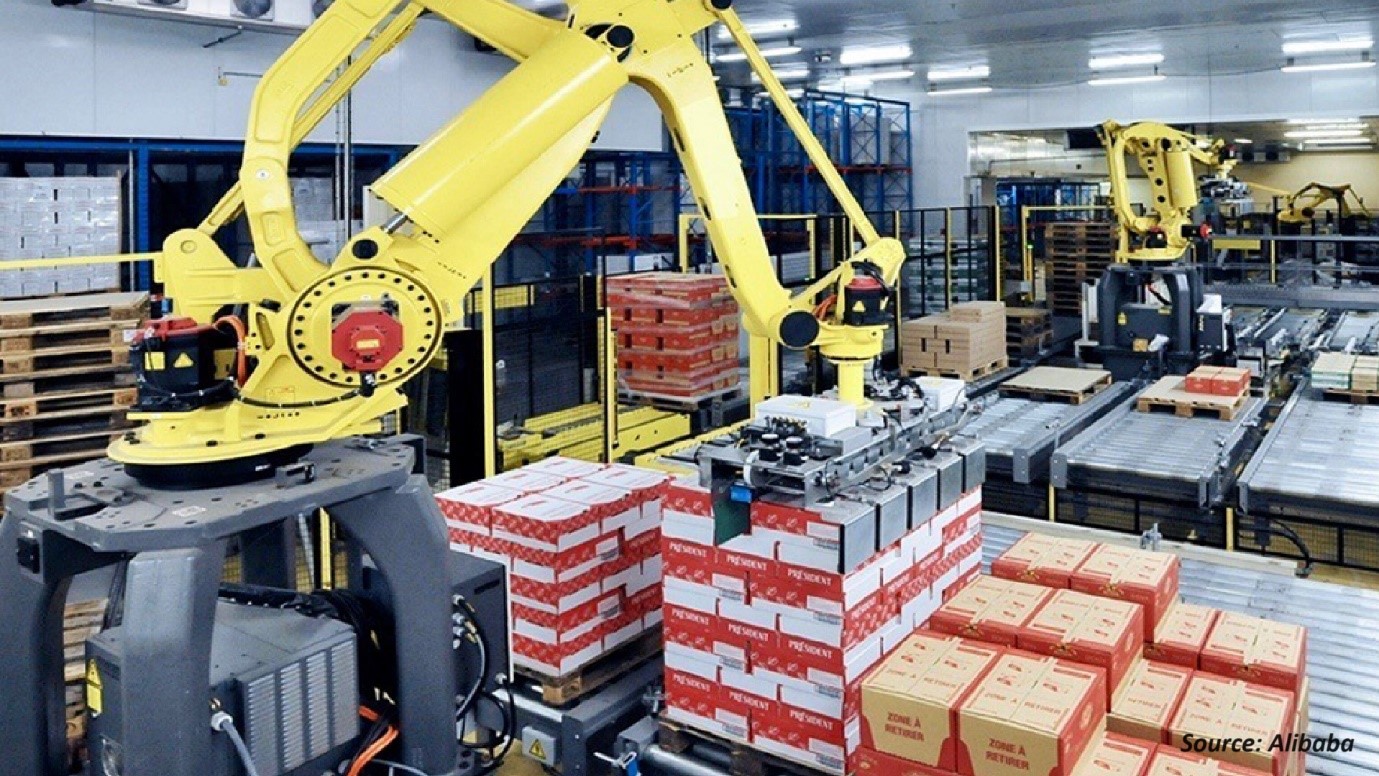
Africa Delta Robots Market by Axis Type (Double Axis, Three Axis, Four Axis, Five Axis, and Six Axis), by Payload Capacity (Up to 3 Kilogram, 3.1 to 8 Kilogram, 8.1 to 15 Kilogram, and More than 15 Kilogram), by Version Environment (Standard and Hygiene), by Application (Assembly, Pick & Place, Material Handling, Palletizing/Packaging, and Others), by Industry Vertical (Electronics, Cosmetics, Food & Beverages, Pharmaceuticals, and Others) – Opportunity Analysis and Industry Forecast, 2023–2030
Industry: ICT & Media | Publish Date: 12-Oct-2023 | No of Pages: 75 | No. of Tables: 59 | No. of Figures: 28 | Format: PDF | Report Code : N/A
Market Definition
The Africa Delta Robots Market was valued at USD 13.07 million in 2022, and is predicted to reach USD 38.1 million by 2030, with a CAGR of 13.36% from 2023 to 2030. Delta or parallel robots are highly specialized robotic systems characterized by their unique mechanical structure and exceptional precision. These robots have three or more arms connected to a common base, forming a parallel mechanism that gives exceptional precision and structural stability.
Delta robots are renowned for their remarkable speed, agility, and accuracy, making them ideal for a wide range of high-speed, precision applications in manufacturing, electronics, food & beverage, pharmaceuticals, and others. The design of delta robots allows them to move with incredible precision in all three dimensions, such as assembly lines, pick-and-place operations, and intricate manufacturing processes, making them particularly well-suited for tasks involving pick and place, assembly, packaging, and material handling.
Their parallel kinematic structure, a robotic system design where multiple limbs work parallel to control end-effector motion, enabling precise coordination and control, provides superior rigidity and stability, ensuring consistent and reliable performance. Depending on their specific configuration, they can handle various payloads, ranging from lightweight items to heavier components.
Thus, delta robots are a class of robotic systems renowned for their speed, precision, and versatility. Their unique parallel structure, including rigidity, speed, and stability, makes them a preferred choice for various high-speed automation tasks across multiple industries, contributing to increased efficiency and precision in modern manufacturing and assembly processes.
Surging Electric Vehicle Production Boosts Market Growth in the Region
The market for delta robots in the region is experiencing substantial growth, primarily fueled by the increasing production of electric vehicles. As the automotive industry shifts towards electric propulsion systems, manufacturers are turning to automation solutions like delta robots to optimize production processes. These robots play a critical role in tasks such as battery assembly, precision welding, and component placement, ensuring efficiency and consistency in electric vehicle manufacturing. This surge in demand for delta robots is a direct response to the region's commitment to electric mobility, making it a key driver of market expansion.
For instance, in September 2022, Morocco's Minister for Trade and Industry announced that the country would have to raise its electric vehicle production to 100,000 every two years against its current 50,000 electric cars production. This will increase the demand for delta robots in the region.
Delta Robots Enhancing Precision and Sterility in African Pharmaceutical Manufacturing
The pharmaceutical industry in Africa is experiencing significant growth, necessitating strict adherence to precise and sterile production processes. In meeting these demanding requirements, delta robots have become increasingly vital.
These robots excel in tasks that demand exceptional precision and maintain the crucial sterility levels essential for pharmaceutical manufacturing. Their ability to handle intricate tasks consistently and with high accuracy plays a pivotal role in ensuring the quality and safety of pharmaceutical products. Thus, creating significant growth of the market.
The High Cost of Delta Robots Hinders Market Growth in Africa
The market for delta robots faces a significant impediment in the form of their high costs. These robots, renowned for their precision and efficiency, often carry a substantial price tag, which can pose a barrier to adoption for numerous businesses, especially those classified as small and medium-sized enterprises (SMEs).
Furthermore, the prolonged return on investment (ROI) period, resulting from these elevated upfront expenses, can discourage companies that seek more immediate cost reductions and efficiency enhancements. This scenario not only hampers market expansion but also contributes to market concentration, with only larger corporations having the financial capacity to both afford and capitalize on this advanced automation technology.
Integration of Advanced Technologies to Enhance Precision Represents a Significant Opportunity for the Market
Integrating advanced technologies, such as computer vision and artificial intelligence (AI), to enhance precision represents a significant opportunity for the delta robot market. These cutting-edge technologies enable delta robots to operate more accurately and efficiently, opening up new avenues for applications across various industries.
The integration of computer vision and AI not only enhances precision but also improves overall productivity and reduces errors in manufacturing processes. This can result in cost savings, higher product quality, and increased competitiveness for businesses that leverage delta robots with these advanced technologies. As industries continue to embrace automation and demand higher precision and flexibility, the delta robot market is poised to benefit significantly from the opportunities created by integrating computer vision and AI.
Competitive Landscape
The Africa delta robots industry includes several market players such as ABB Ltd., Fanuc Corporation, Kawasaki Heavy Industries Ltd, Yaskawa Electric Corporation, FESTO, Weiss GmbH, Omron Corporation, IGUS GmbH, Cama Group, and KUKA AG.
Key Benefits
-
The Africa delta robots market report provides a quantitative analysis of the current market and estimations through 2023-2030 that assists in identifying the prevailing market opportunities to capitalize on.
-
The study comprises a deep dive analysis of the market trend including the current and future trends for depicting the prevalent investment pockets in the market.
-
The information related to key drivers, restraints, and opportunities and their impact on the market is provided in the report.
-
The competitive analysis of the market players along with their market share in the Africa delta robots market.
-
The SWOT analysis and Porter’s Five Forces model are elaborated in the study.
-
Value chain analysis in the market study provides a clear picture of the stakeholders’ roles.
Africa Delta Robots Market Key Segments
By Axis Type
-
Double Axis
-
Three Axis
-
Four Axis
-
Five Axis
-
Six Axis
By Payload Capacity
-
Upto 3 Kilogram
-
3.1 to 8 Kilogram
-
8.1 to 15 Kilogram
-
More than 15 Kilogram
By Version Environment
-
Standard
-
Hygiene
By Application
-
Assembly
-
Pick & Place
-
Material Handling
-
Palletizing/ Packaging
-
Primary
-
Secondary
-
-
Others
By Industry Vertical
-
Electronics
-
Cosmetics
-
Food & Beverages
-
Pharmaceuticals
-
Others
Report Scope and Segmentation
|
Parameters |
Details |
|
Market Size in 2022 |
USD 13.07 Million |
|
Market Volume in 2022 |
670 Units |
|
Revenue Forecast in 2030 |
USD 38.1 Million |
|
Growth Rate |
CAGR of 13.36% from 2023 to 2030 |
|
Analysis Period |
2022–2030 |
|
Base Year Considered |
2022 |
|
Forecast Period |
2023–2030 |
|
Market Size Estimation |
Million (USD) |
|
Growth Factors |
The rise in electric vehicle production. Increased adoption of delta robots in pharmaceutical manufacturing. |
|
Companies Profiled |
10 |
|
Market Share |
Available for 10 companies |
|
Customization Scope |
Free customization (equivalent up to 80 working hours of analysts) after purchase. Addition or alteration to country, regional, and segment scope. |
|
Pricing and Purchase Options |
Avail customized purchase options to meet your exact research needs. |
Key Players
-
ABB Ltd.
-
Fanuc Corporation
-
Kawasaki Heavy Industries Ltd.
-
Yaskawa Electric Corporation
-
FESTO
-
Weiss GmbH
-
Omron Corporation
-
IGUS GmbH
-
Cama Group
-
KUKA AG




 Speak to Our Analyst
Speak to Our Analyst


































